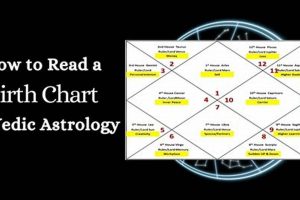In Vedic astrology, the south lunar node, a shadowy, serpentine planetary influence, signifies spirituality, liberation, and occult knowledge. It is considered a karmic planet, reflecting past-life actions and influencing the present. This celestial body is often depicted with a headless form, symbolizing detachment from worldly desires and a focus on higher consciousness. For example, a prominent placement in a birth chart could suggest an inclination towards spiritual pursuits or an intuitive grasp of hidden realities.
This shadowy influence plays a vital role in understanding one’s karmic path and predisposition towards spiritual growth. Its presence can indicate areas of life where one may experience sudden changes, unexpected events, and profound transformations, ultimately leading towards liberation from material attachments. Historically, this celestial influence has been associated with both challenges and opportunities, representing the need to shed old patterns and embrace new beginnings. Its energy is believed to facilitate deep inner work and the potential for profound spiritual awakening.
Further exploration of this specific planetary influence in Vedic astrology will delve into its effects in different houses, its relationships with other celestial bodies, and its significance in various astrological charts. Understanding its nuances provides valuable insights into individual karmic patterns, spiritual inclinations, and potential for transformative growth.
Harnessing the energy of the south lunar node in Vedic astrology requires understanding its karmic implications and embracing its transformative potential. The following tips offer guidance for navigating its influence:
Tip 1: Embrace introspection. Regular self-reflection can illuminate areas where past-life influences manifest in current life experiences. Journaling, meditation, and contemplative practices are beneficial.
Tip 2: Cultivate detachment. Recognizing the impermanent nature of material possessions and worldly achievements helps lessen their hold and fosters spiritual growth. Minimizing attachments can create space for deeper meaning.
Tip 3: Seek spiritual guidance. Connecting with mentors, spiritual teachers, or engaging in philosophical studies can provide valuable support during periods of transformation and uncertainty.
Tip 4: Develop intuition. The south lunar node enhances intuitive abilities. Practicing mindfulness and cultivating inner stillness can strengthen this connection.
Tip 5: Accept change. This planetary influence often brings unexpected shifts. Embracing these changes as opportunities for growth, rather than resisting them, can lead to profound breakthroughs.
Tip 6: Explore past lives. Past life regression or exploration through other modalities can provide insights into karmic patterns and offer clarity on current life circumstances.
Tip 7: Practice compassion. Understanding karmic influences fosters empathy and compassion, both for oneself and others. This understanding promotes forgiveness and acceptance.
By incorporating these practices, individuals can navigate the transformative energy of this celestial body with greater awareness and harness its potential for spiritual evolution. These approaches facilitate a deeper understanding of karmic patterns and support growth towards liberation.
These insights into the south lunar node provide a foundation for further exploration of its complex influence in Vedic astrology, paving the way for deeper self-discovery and spiritual understanding.
1. South Lunar Node
The South Lunar Node, commonly referred to as Ketu in Vedic astrology, represents a point of karmic culmination. It signifies the release of past-life experiences, shaping present inclinations and tendencies. This celestial point doesn’t possess a physical form; it’s a calculated point in space, marking the intersection of the Moon’s orbit with the ecliptic. Its influence is often described as shadowy and enigmatic, symbolizing the subconscious and the unseen forces that shape destiny. For example, a prominent South Lunar Node placement in the birth chart might indicate innate talents or predispositions stemming from past lives. These might manifest as a natural aptitude for music, a deep-seated spiritual inclination, or even a recurring pattern in relationships.
The South Lunar Node’s connection to past karma offers valuable insights into current life circumstances. It highlights areas where one might experience effortless success or face recurring challenges. Understanding its placement in the birth chart can illuminate the karmic lessons an individual is meant to learn in this lifetime. It also suggests potential areas of detachment, indicating where one might need to release attachments to material possessions, relationships, or ingrained beliefs to achieve spiritual growth. For instance, someone with the South Lunar Node in the second house, representing possessions and values, might encounter situations that challenge their attachment to material wealth, prompting a shift towards a more minimalist lifestyle or a greater focus on intrinsic values.
In essence, the South Lunar Node, or Ketu, serves as a karmic compass within Vedic astrology. It provides a framework for understanding past influences, navigating present challenges, and embracing the potential for spiritual evolution. While often associated with disruptive change or unexpected events, these experiences ultimately serve the purpose of karmic resolution and liberation from past-life conditioning. By recognizing the significance of the South Lunar Node, individuals gain a deeper understanding of their karmic journey and the opportunities for growth it presents.
2. Karmic Influence
Ketu, the south lunar node in Vedic astrology, embodies karmic influence, representing the culmination of past-life experiences. Understanding its significance illuminates the karmic patterns woven into the present life, offering insights into inherent strengths, weaknesses, and the potential for spiritual growth. Examining specific facets of this karmic influence provides a deeper understanding of Ketu’s role in shaping an individual’s destiny.
- Past-Life Residue:
Ketu acts as a repository of past-life experiences, both positive and negative. These experiences manifest as inherent talents, deeply rooted fears, or recurring patterns in relationships. For example, an individual with a prominent Ketu in the fifth house, representing creativity and self-expression, might possess a natural artistic talent cultivated in a past life. Conversely, a challenging Ketu placement could indicate unresolved karmic issues requiring attention in the present.
- Spiritual Liberation:
While carrying the weight of past karma, Ketu also represents the potential for liberation from these patterns. It encourages detachment from material desires and worldly attachments, propelling individuals towards spiritual growth. A strong Ketu influence can indicate a natural inclination towards spiritual practices and a deep yearning for self-realization. For instance, Ketu in the twelfth house, representing spirituality and seclusion, can signify a strong pull towards monastic life or deep meditative practices.
- Unexpected Events:
Ketu’s influence is often associated with sudden, unexpected events that disrupt the status quo. These disruptions, while potentially challenging, serve as catalysts for karmic growth, pushing individuals to confront unresolved issues and break free from limiting patterns. A sudden job loss, for example, triggered by a Ketu transit, might force a person to re-evaluate their career path and align with a more fulfilling purpose.
- Intuitive Guidance:
Ketu heightens intuitive abilities, providing access to deeper levels of understanding and self-awareness. This enhanced intuition serves as a guide, helping individuals navigate karmic challenges and make choices aligned with their soul’s purpose. A well-placed Ketu can manifest as a strong gut feeling, prophetic dreams, or a heightened sensitivity to subtle energies.
These interconnected facets of karmic influence, embodied by Ketu, provide a framework for understanding its impact on an individual’s life. By recognizing Ketu’s role as a karmic indicator, individuals gain a deeper appreciation for their present circumstances and the potential for spiritual transformation it presents. Ketu’s influence urges introspection, encouraging a deeper exploration of past-life patterns and their impact on the present journey towards liberation.
3. Spiritual Liberation
In Vedic astrology, Ketu, the south lunar node, plays a significant role in spiritual liberation, or moksha. It represents the culmination of past-life experiences, signifying the release of karmic baggage and the potential for spiritual awakening. Ketu’s influence fosters detachment from material desires and worldly attachments, propelling individuals toward self-realization. This detachment, while sometimes experienced as loss or disappointment, ultimately clears the path for spiritual growth. For example, an individual with a prominent Ketu in the twelfth house, associated with spirituality and seclusion, might experience a deep yearning for solitude and introspection, leading them toward spiritual practices and a quest for higher meaning. Similarly, a challenging Ketu transit can trigger unexpected life changes, such as the loss of a job or the ending of a relationship, which, while initially painful, can catalyze spiritual growth by forcing a reevaluation of priorities and a shift away from material attachments. Ketu’s association with past karma provides a framework for understanding the root causes of current life circumstances and the opportunities they present for spiritual evolution.
The pursuit of spiritual liberation through Ketu’s influence involves embracing its transformative energy. This often requires navigating challenging experiences and confronting deeply ingrained patterns. Ketu’s energy encourages introspection, prompting individuals to examine their attachments and motivations. This self-inquiry facilitates the release of limiting beliefs and karmic patterns, paving the way for spiritual awakening. For instance, an individual experiencing a Ketu transit opposing their natal Sun might undergo a period of intense self-reflection, leading to a profound shift in identity and purpose. This transformative period can be challenging, but ultimately leads to greater self-awareness and spiritual growth. Practical applications of this understanding include engaging in spiritual practices like meditation, yoga, and self-inquiry to harness Ketu’s energy constructively. Studying one’s birth chart and understanding Ketu’s placement can offer personalized insights into karmic patterns and potential pathways for spiritual development.
Ketu’s connection to spiritual liberation underscores its importance in Vedic astrology. It provides a framework for understanding the karmic influences shaping an individual’s life and the potential for spiritual growth embedded within those experiences. While navigating Ketu’s influence can present challenges, embracing its transformative energy facilitates the release of limiting patterns and the pursuit of self-realization. Understanding the nuances of Ketu’s placement in the birth chart and its transits provides valuable guidance for navigating life’s complexities and pursuing the path of spiritual liberation. The path towards moksha through Ketu is not always easy, but it offers profound opportunities for growth and the realization of one’s true potential.
4. Occult Knowledge
Within Vedic astrology, Ketu, the south lunar node, holds a strong association with occult knowledge, mysticism, and esoteric wisdom. This connection stems from Ketu’s representation of the unseen, the subconscious, and the karmic residue of past lives. Its influence often manifests as an innate interest in hidden dimensions, a fascination with the mysteries of life and death, and a predisposition towards spiritual exploration. This section explores the multifaceted relationship between Ketu and occult knowledge, providing a deeper understanding of its implications.
- Intuition and Psychic Abilities:
Ketu enhances intuitive abilities and can awaken latent psychic potentials. Individuals with a strong Ketu influence often experience heightened sensitivity to subtle energies, precognitive dreams, or a strong “gut feeling” that guides their decisions. This connection to the unseen realms facilitates access to information beyond the confines of the five senses. For example, someone with Ketu prominently placed in the eighth house, associated with the occult and hidden matters, might possess a natural aptitude for astrology, tarot, or other divinatory practices.
- Past-Life Recall and Karmic Understanding:
Ketu’s connection to past lives facilitates access to karmic knowledge and understanding. This can manifest as spontaneous memories of past lives, an intuitive grasp of karmic patterns, or a deep fascination with exploring past-life experiences. This understanding of past-life influences can provide valuable insights into current life circumstances and facilitate spiritual growth. For example, recurring dreams of a specific time period or culture could indicate a significant past-life connection.
- Interest in Mysticism and Esoteric Studies:
Ketu’s influence often sparks a deep interest in mysticism, esoteric philosophies, and occult practices. This can lead individuals to explore various spiritual traditions, delve into ancient texts, and seek knowledge beyond the conventional realm. This pursuit of hidden wisdom can lead to profound self-discovery and spiritual transformation. For example, a strong Ketu influence could lead someone to study Kabbalah, Theosophy, or other esoteric systems.
- Spiritual Awakening and Transformation:
Ketu’s connection to occult knowledge ultimately serves the purpose of spiritual awakening and transformation. By delving into the hidden dimensions of reality, individuals gain a deeper understanding of themselves, their karmic patterns, and the nature of existence. This understanding can lead to profound shifts in perspective and a greater sense of purpose. For instance, exploring past-life connections through regression therapy can help resolve present-life challenges and facilitate emotional healing.
These facets of occult knowledge, linked to Ketu’s influence, offer a glimpse into its transformative potential. By embracing Ketu’s energy and exploring its connection to the unseen realms, individuals can unlock hidden wisdom, accelerate spiritual growth, and gain a deeper understanding of their karmic journey. Ketu’s association with occult knowledge ultimately serves as a catalyst for self-discovery and the realization of one’s true potential.
5. Transformation, Change
Within Vedic astrology, Ketu, the south lunar node, signifies profound transformation and often unexpected change. It represents the release of past-life karma and the dismantling of outdated patterns, propelling individuals toward spiritual growth and liberation. This association with change is not always comfortable; it can manifest as disruptive events, sudden shifts in circumstances, and the need to relinquish familiar attachments. Understanding Ketu’s transformative influence provides a framework for navigating these periods of change with greater awareness and resilience.
- Sudden Shifts and Disruptions:
Ketu’s influence is often associated with sudden, unexpected changes that disrupt the status quo. These disruptions can manifest in various life areas, from career and relationships to health and personal beliefs. While these shifts can be challenging, they serve as catalysts for growth, pushing individuals to confront unresolved issues and embrace new directions. For instance, a sudden job loss during a Ketu transit might lead to a career change that aligns more closely with one’s true calling.
- Release of Attachments:
Ketu encourages detachment from material possessions, worldly desires, and limiting beliefs. This process of letting go can be challenging, often involving loss or separation. However, releasing attachments creates space for spiritual growth and allows individuals to embrace new possibilities. For example, the ending of a long-term relationship during a Ketu period, while painful, can pave the way for personal growth and the discovery of a more fulfilling partnership in the future.
- Spiritual Awakening and Growth:
The transformative changes brought about by Ketu ultimately serve the purpose of spiritual awakening and evolution. By dismantling outdated patterns and challenging ingrained beliefs, Ketu creates opportunities for individuals to connect with their true selves and embrace a more authentic way of being. For example, a period of intense introspection during a Ketu transit might lead to a profound shift in values and a greater commitment to spiritual practices. This inner transformation can manifest outwardly as changes in lifestyle, relationships, and career choices.
- Embracing the Unknown:
Ketu’s influence encourages individuals to embrace the unknown and step outside their comfort zones. This can involve taking risks, exploring new paths, and embracing uncertainty. While this can be daunting, it fosters resilience, adaptability, and a willingness to embrace life’s unexpected turns. For instance, someone influenced by Ketu might feel compelled to travel to a foreign country, learn a new skill, or embark on a creative project that pushes them beyond their perceived limitations.
These interconnected facets of transformation, driven by Ketu’s influence, highlight its role as a catalyst for growth and evolution. While navigating Ketu’s energy can be challenging, embracing its transformative power facilitates the release of limiting patterns, the pursuit of spiritual liberation, and the realization of one’s true potential. By understanding Ketu’s influence, individuals can approach periods of change with greater awareness, courage, and a deeper appreciation for the transformative opportunities they present.
6. Detachment, Disinterest
In Vedic astrology, Ketu, the south lunar node, signifies detachment and disinterest in worldly affairs. This aspect of Ketu reflects its association with spiritual liberation and the release of karmic attachments. While often perceived negatively, disinterest driven by Ketu is not apathy; rather, it represents a shift in focus from the material to the spiritual. Understanding this nuanced perspective is crucial for interpreting Ketu’s influence in a birth chart.
- Disillusionment with Material Pursuits:
Ketu can foster a sense of disillusionment with material pursuits, status, and worldly achievements. This can manifest as a lack of ambition in conventional terms, a preference for simple living, or a rejection of societal expectations. This detachment from material desires creates space for spiritual seeking and self-discovery. For example, an individual with a strong Ketu influence might abandon a lucrative career to pursue a simpler, more spiritually fulfilling path.
- Focus on Inner Growth:
Ketu’s influence redirects focus inwards, fostering introspection, self-inquiry, and a pursuit of deeper meaning. This inward focus often manifests as a disinterest in external validation or social recognition. The individual’s attention shifts towards understanding their karmic patterns and pursuing spiritual growth. For instance, someone with a prominent Ketu might dedicate their time to meditation, yoga, or other spiritual practices rather than pursuing social engagements.
- Unconventional Paths and Perspectives:
Ketu encourages individuals to explore unconventional paths and perspectives. This can lead to a disinterest in traditional norms and a willingness to challenge established beliefs. This unconventional approach often leads to unique insights and a deeper understanding of life’s mysteries. For example, a strong Ketu influence could lead someone to explore alternative healing modalities, unconventional philosophies, or non-traditional career paths.
- Acceptance of Impermanence:
Ketu fosters an understanding of impermanence, leading to a detachment from outcomes and a greater acceptance of life’s inevitable changes. This acceptance of impermanence can manifest as a sense of equanimity in the face of challenges and a willingness to surrender to the flow of life. For instance, an individual influenced by Ketu might approach life’s ups and downs with greater composure and acceptance than someone more attached to specific outcomes.
These facets of detachment and disinterest, driven by Ketu’s influence, contribute significantly to its role in spiritual liberation. By fostering a disinterest in the material realm, Ketu encourages a deeper exploration of the spiritual dimension, leading to self-discovery, karmic understanding, and ultimately, the realization of one’s true potential. Ketu’s influence guides individuals toward a path of inner growth, encouraging the release of attachments and the embrace of a more meaningful and fulfilling existence.
7. Shadowy, Headless Form
The depiction of Ketu, the south lunar node in Vedic astrology, as a shadowy, headless form holds symbolic significance, reflecting its astrological influences and karmic implications. This headless form represents detachment, disinterest in worldly affairs, and the release of ego. The shadowy nature alludes to Ketu’s connection to the unseen realms, the subconscious mind, and the mysteries of past lives. This imagery reinforces Ketu’s role as a karmic agent, signifying the culmination of past experiences and the drive towards spiritual liberation. For example, the headless form symbolizes the letting go of the ego’s desires and attachments, which is crucial for spiritual advancement according to Vedic teachings. An individual with a prominent Ketu placement might exhibit a natural detachment from material pursuits or a disinterest in social recognition, mirroring this symbolic representation.
This symbolic representation provides a deeper understanding of Ketu’s influence. The absence of a head signifies a lack of attachment to the material world and a focus on spiritual pursuits. The shadowy form suggests an enigmatic and often unpredictable energy, signifying unexpected events and transformative experiences that can lead to spiritual growth. This understanding helps interpret Ketu’s placement in a birth chart, revealing potential karmic lessons and areas where detachment is necessary for spiritual evolution. For instance, a strong Ketu in the tenth house of career might signify a lack of ambition in traditional career paths, potentially leading the individual toward unconventional or spiritually oriented professions. Understanding the symbolism allows individuals to work with Ketu’s energy rather than resisting it, facilitating the process of karmic resolution and spiritual liberation.
The shadowy, headless form of Ketu serves as a potent reminder of its transformative power and its role in spiritual liberation. While Ketu’s influence can manifest as challenging experiences, its ultimate purpose is to propel individuals toward self-realization and the release of karmic baggage. By embracing Ketu’s symbolism, individuals gain valuable insights into their karmic journey and the potential for spiritual growth it presents. The image reinforces the importance of detachment, introspection, and the pursuit of higher consciousness in navigating the complexities of life and fulfilling one’s karmic destiny.
Frequently Asked Questions about the South Lunar Node in Vedic Astrology
This section addresses common inquiries regarding the south lunar node, providing clarity on its influence and significance in Vedic astrology.
Question 1: What is the primary significance of the south lunar node in a birth chart?
The south lunar node represents past-life karma and indicates areas where an individual may experience effortless success due to past-life mastery or ingrained tendencies. It also highlights areas requiring detachment and the release of past patterns.
Question 2: How does the south lunar node differ from the north lunar node (Rahu)?
While the south lunar node represents past karma and the need for release, the north lunar node signifies current life lessons and desires. The south lunar node encourages detachment, while the north lunar node fosters ambition and pursuit.
Question 3: Can the south lunar node’s influence be considered malefic?
Not necessarily. While its influence can bring challenges and disruptions, these experiences ultimately facilitate spiritual growth and karmic liberation. Its influence encourages introspection and detachment, which are crucial for spiritual evolution.
Question 4: How can one mitigate the negative effects associated with a challenging south lunar node placement?
Remedial measures can include spiritual practices like meditation, mantra recitation, and acts of selfless service. Understanding the specific karmic lessons indicated by the south lunar node’s placement is crucial for effective remediation.
Question 5: Does the south lunar node impact relationships?
Yes, it can signify karmic relationships, often characterized by intensity and the need to resolve past-life patterns. These relationships can be challenging but offer profound opportunities for growth and understanding.
Question 6: How does the south lunar node influence career choices?
It can indicate a natural aptitude for specific professions based on past-life skills and experiences. It can also signify a lack of interest in conventional career paths, leading individuals towards unconventional or spiritually oriented professions.
Understanding the south lunar node’s influence offers valuable insights into an individual’s karmic journey and potential for spiritual growth. It emphasizes the importance of embracing change, cultivating detachment, and pursuing self-awareness.
Further exploration of specific placements and aspects involving the south lunar node will provide a more personalized understanding of its impact on individual lives.
Understanding the South Lunar Node in Vedic Astrology
This exploration of the south lunar node in Vedic astrology has highlighted its multifaceted significance as a karmic indicator, a spiritual catalyst, and a gateway to occult knowledge. Its influence, often associated with transformation and detachment, underscores the importance of embracing change, cultivating introspection, and releasing past-life attachments. The south lunar node’s connection to spiritual liberation emphasizes its role in guiding individuals toward self-realization and a deeper understanding of their karmic journey.
The south lunar node’s symbolism as a shadowy, headless form serves as a potent reminder of the need to transcend ego-driven desires and embrace the transformative power of detachment. By understanding and integrating the wisdom offered by this celestial influence, individuals can navigate life’s complexities with greater awareness, resilience, and a profound appreciation for the opportunities for spiritual growth presented along the karmic path. Further exploration of this complex planetary influence promises deeper insights into the interplay of karma, destiny, and the pursuit of spiritual liberation.







